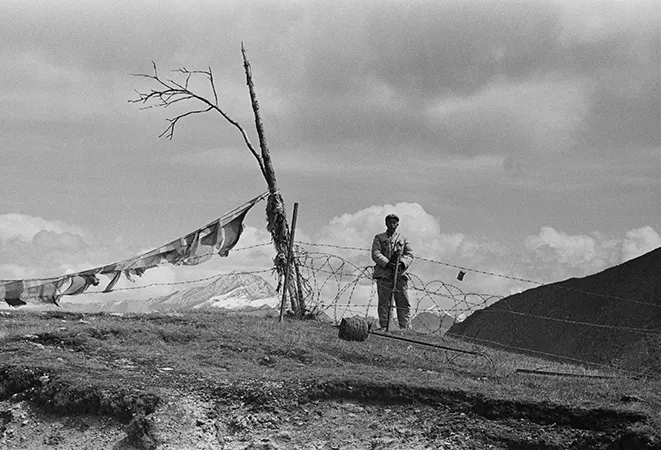-
CENTRES
Progammes & Centres
Location
Peace and war are not the only options in any bilateral relationship. Numerous issues, more or less serious, emerge between two countries which demand understanding, maturity, good judgment and sagacity on the part of leaderships.

Over the last two decades India-China relations had been witnessing tangible improvement and increasing warmth. Tourism was increasing, student traffic from India to China was gaining in significance, academic visits and think tank conferences were becoming more frequent and friendly, Chinese investments — though not huge, was on the upswing just as trade was enormously expanding though much of it was not in India’s favour. Indications were there that India’s perception towards China was perhaps gaining in positivity. Facilitating these developments were the different agreements India entered into with China between 1993 and 2013 and her decision to continue to warm up towards China in the following years. This was also possible because Chinese leaders, from Deng Xiaoping onwards, invested their time and interest in improving relations with India.
"Indications were there that India’s perception towards China was perhaps gaining in positivity. Facilitating these developments were the different agreements India entered into with China between 1993 and 2013 and her decision to continue to warm up towards China in the following years."
The top leaders since Prime Minister Modi’s coming to power in 2014 met innumerable times in India, in China and elsewhere on different bilateral and multilateral platforms. Post Doklam, Modi-Xi meeting in Wuhan in April 2018 generated the phrase the “Wuhan spirit” promising a new era in relationship between India and China. It was followed by Mamallapuram meet in as late as October 2019 encouraging the Economic Times of 13 October to comment that Modi and Xi’s “strategic communication is deepening.” Prime Minister had also encouraged several chief ministers to visit China more than once to secure investments in their states, visits which did produce some results. Earlier, Modi as Chief Minister of Gujarat, had set his eyes on China as a source of investment for his state when in 2011 during his visit to China he declared that “the two great countries will make Asia the centre stage of global economy.”
During Modi’s visit to China in May 2015 , he and Mr. Xi inaugurated a ‘State/Provincial Leaders’ Forum’ and in its first meeting he declared that in India “the states have a vital role to play in the national development’ and appreciated that both countries are ‘taking our relationship outside our national capitals to state capitals and cities.” In other words, there were clear signs that the new leaders were committed to inject new blood in their bilateral relationship taking advantage of the agreements and informal interactions of the recent past.
"There were clear signs that the new leaders were committed to inject new blood in their bilateral relationship."
In this context, the events of May-June along the western sector of our border come as a surprise, or indeed as a shock. The events are only gradually making their way to the public. Questions such as when and where did they start, what exactly was the nature of the events, how did the two sides respond and with what consequences are still not very clear. What we know is the tragedy of what happened on 15 June. There are still considerable haziness about what really produced this outcome leading to the tragic end to the lives of our twenty soldiers and an unknown number of casualties on the Chinese side.
Since Prime Minister Rajiv Gandhi’s visit to China in December 1988 after a lapse of 34 years, the relationship between the two countries continued to improve in multiple directions under different prime ministers on the assumption that the issue of settlement of border can be pushed to the backburner while improvement in other areas could provide a conducive context for its settlement at a convenient time. In continuation of such policies the last few years saw a real bonhomie between the two countries. Given this context, the events of this summer are absolutely unexpected.
"The events are only gradually making their way to the public. Questions such as when and where did they start, what exactly was the nature of the events, how did the two sides respond and with what consequences are still not very clear."
What could possibly be the reason for China to suddenly change the track? Among the possible reasons being discussed in the public domain are one, that China suddenly feels globally isolated and criticised, even if covertly, for its ‘neglect’ in promptly reporting the occurrence of novel corona virus within China. Coupled with that is the accusation of exporting defective protective and test materials for fighing the virus. This isolation is leading China to renew its assertion of power both in South and East China seas as well as in India-China border. Secondly, it is being argued that China is taking advantage of India’s deteriorating relations with South Asian neighbours. Pakistan apart, our relations with Nepal is backsliding since the blockade of 2016. India’s domestic policies, such as, implementing National Population Register and Citizenship Amendment Act, have miffed Bangladesh. Bhutan has not shown any interest in BBIN. With Rajapaksha in power, Sri Lanka will have no love lost for India. Even the new regime in Maldives, supposedly friendly towards India unlike the earlier regime, is lately warming up to China.
Thirdly, there is also the apprehension that Chinese assertion on the LAC in Ladakh could be a response to India’s changing the status of Ladakh by deleting Article 370 of the Indian Constitution. Change in Ladakh’s status took place in August 2019 and Chinese activities on LAC reportedly started in early September that year and more decidedly right after the end of the following winter, an interesting coincidence indeed. Finally, it could be an attempt by Chinese PLA to gain strategic advantage by coming closer to the Darbuk-Shyok-Daulat Beg Oldie all weather road that India has built over twenty years to strengthen access to DBO airport. It could then block or cut the road if and when it wanted to. Underlying any or all of these could be the Chinese intention to prevent India from getting close to the US and to pull India away from playing a leading role in the Indian Ocean in collaboration with the United States and Japan.
"If the long-held status quo on the border cannot be respected nor can it be pushed to the backburner, it is imperative that both countries should invest everything in their relationship to settle the border issue peaceably once for all."
Be that as it may, what is surprising and sad is that at this juncture, when because of the assiduous efforts of the leaders of both countries, an atmosphere of trust, mutual appreciation and a feeling that we can agree to disagree was developing and a multifaceted relationship at the political, economic, trade and civil society levels was beginning to show signs of life, events should be allowed to get out of hand discounting all of these past positive developments and turning the clock back by half a century. If the long-held status quo on the border cannot be respected nor can it be pushed to the backburner, it is imperative that both countries should invest everything in their relationship to settle the border issue peaceably once for all.
Peace and war are not the only options in any bilateral relationship. Numerous issues, more or less serious, emerge between two countries which demand understanding, maturity, good judgment and sagacity on the part of leaderships. This is all the more so when a democracy is dealing with a non-democratic regime. International crises are not the best times for winning popularity. They demand hard and cool reflection and thoughtful action for keeping options open. For India, we need to realise that trade has its natural paths and it is difficult to alter them, more so within a short time. It is indeed necessary for India and for the world as well, in the face of Covid-19, to think out the best ways to reorganise the supply chains. Perhaps, regime affinity could be a reassuring factor in restricting supply chains. Chinese investments and use of Chinese technology are also issues that can come under scrutiny in the medium and long term. All these would involve costs that we must agree to bear.
In the short run, both countries should stick to negotiation at all possible levels. It is incumbent on China that it respects the agreements she has entered into with India regarding maintenance of peace and tranquility on the border as well as cooperation in border defence. China as a nuclear power and with great power ambitions is expected to behave with restraint and moderation and not succumb to nationalistic jingoism.
The views expressed above belong to the author(s). ORF research and analyses now available on Telegram! Click here to access our curated content — blogs, longforms and interviews.

Professor in Political Science, Calcutta University (Retired 2008). Formerly Dean, Faculty of Arts, Calcutta University; Visiting Fellow in Political Science and Associate, Committee on South ...
Read More +